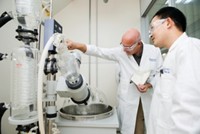Advertisement
Grab your lab coat. Let's get started
Welcome!
Welcome!
Create an account below to get 6 C&EN articles per month, receive newsletters and more - all free.
It seems this is your first time logging in online. Please enter the following information to continue.
As an ACS member you automatically get access to this site. All we need is few more details to create your reading experience.
Not you? Sign in with a different account.
Not you? Sign in with a different account.
ERROR 1
ERROR 1
ERROR 2
ERROR 2
ERROR 2
ERROR 2
ERROR 2
Password and Confirm password must match.
If you have an ACS member number, please enter it here so we can link this account to your membership. (optional)
ERROR 2
ACS values your privacy. By submitting your information, you are gaining access to C&EN and subscribing to our weekly newsletter. We use the information you provide to make your reading experience better, and we will never sell your data to third party members.
Business
Selling Drugs to Other Drug Firms
India's Jubilant Organosys finds success as a company that only serves other companies
by JEAN-FRANÇOIS TREMBLAY, C&EN HONG KONG
May 2, 2005
| A version of this story appeared in
Volume 83, Issue 18

When describing Jubilant Organosys, his contract research and manufacturing company, Chairman and Managing Director Shyam S. Bhartia speaks with the calm confidence of someone who has little to prove. The firm that he cofounded with his brother Hari 27 years ago already does business with most of the world's largest pharmaceutical and agrochemical companies.
"There are still a few new customers who do come in, but the growth in orders is more from existing ones," he says. Jubilant serves about 130 companies worldwide, and its rapid rise is a sign that it has been doing something right. The company's customers are suppliers of generic pharmaceuticals and, to a lesser extent, drug discovery firms. Owing to confidentiality agreements, however, Jubilant cannot name any of them.
Headquartered 40 minutes by car from New Delhi in Noida, Jubilant bills itself as India's largest contract research and manufacturing service provider in the agrochemical and drug sectors. Unlike most other Indian custom manufacturers, it does not also market its own branded drugs to distributors, pharmacies, or patients. "We are not good in that kind of marketing," Bhartia says. But its capabilities are more than adequate for serving other companies.
In Bangalore in southern India, it operates a chemo- and bioinformatics service center staffed with more than 350 operators. Near there, it also has a major active pharmaceutical ingredients (API) plant. In Noida in northern India, it operates three labs staffed with a total of nearly 250 scientists offering services in medicinal chemistry, formulation, and clinical trials. In nearby Gajraula, it runs a plant making fine chemicals and advanced drug and agchem intermediates. In Belgium, its subsidiaries PSI and PSI Supply provide expertise in regulatory affairs as well as development and supply of dosage forms.

THE COMPANY'S research labs in Noida have been expanding particularly fast. The facility where research is performed on finished dosage forms of regulated drugs has been operating for only two months. Construction of clinical research facilities is still being completed. Within a year, the company expects to employ 500 people in Noida. Rajesh Bhaskar, who manages Jubilant's API research activities, explains the rapid buildup by pointing out that Jubilant started to offer research services later than other Indian custom manufacturers. He adds that customer requirements are also growing rapidly.
Gour Mukherji, manager of the dosage form research facility, says Jubilant seeks to avoid patent infringement, a task that is more difficult than it sounds. Large pharmaceutical companies patent not only the active ingredients in their drugs, but also the various formulations and delivery methods. In some cases, even packaging is patented. Another constraint, he says, is trying to avoid the production of a generic drug that is more effective than the original. Such a product, ironically, would fail to gain regulatory approval unless it went through clinical trials similar to a new drug.
Listed on the Mumbai stock exchange and the Indian National Stock Exchange, Jubilant Organosys is the main unit of the business group Jubilant Corp. The group's other activities include oil exploration, trading and maintenance of aircraft, power projects, and operating the Domino's Pizza franchise in India. Organosys accounted for 57% of Jubilant Corp.'s overall sales of $370 million last year. In turn, Organosys' sales of pharmaceutical and life sciences services grew 46% in 2003 and 61% in 2004. Organosys is also a producer of industrial chemicals.
Shyam Bhartia and his brother Hari S. Bhartia are both prominent businessmen. A certified accountant, Shyam has been a director of Air India and is now on the executive committee of the Federation of Indian Chamber of Commerce & Industry. Equally active in the business community, Hari is a chemical engineer trained at the Indian Institute of Technology, in Delhi.
Bhartia the accountant notes that Organosys is first and foremost a manufacturer, and one that was founded when India was under a different economic model. At the time, its products were acetaldehyde, acetic acid, acetic anhydride, and vinyl acetate. Companies were heavily influenced by bureaucrats who encouraged national self-sufficiency at the expense of economic efficiency. It's a completely different regime now, Bhartia says. "Back then, we were guided by the need to get approvals; now we're guided by what the market needs."
When India initiated market reforms in the early 1990s, the Bhartia brothers foresaw that industrial chemical plants in the country couldn't compete well against ones in the Middle East. "We did our introspection and decided that we are very good in chemistry," he says. Deciding to "move up the value chain," the company added research to its range of services. "That is a good basis to expand," he says. Manufacturing, however, remains a core capability. Jubilant measures its performance in that area through a General Electric-inspired Six Sigma program that also monitors customer satisfaction.
In particular, industrial chemicals are still an important market for Organosys, which makes a range of specialty chemicals for the pharmaceutical, agrochemical, construction, textile, and paper industries. It reckons it is the world's second largest producer of pyridine and derivatives. One of its pyridine plants, in Gajraula, sources its hydrocarbon feedstock from molasses that comes from the area's sugar industry.
Bhartia points to the use of sugarcane as a feedstock to illustrate Organosys' commitment to sustainable growth, which--like DuPont's Charles O. Holliday Jr.--he links to the "triple bottom line" of economic, environmental, and social concerns. Sustainability is also good business, he says. "Customers don't want to go to a manufacturer who will become less competitive over time because of insufficient investment in health, safety, and environment."
Rapidly rising salaries for chemists and other scientists in India, the result of the boom in the pharmaceutical service sector, have raised questions about the sustainability of India's cost advantage as a provider of contract research. In the Hyderabad area, managers say salaries have increased fourfold in just a few years and that companies are resorting to aggressively poaching employees from each other.
Bhartia welcomes the salary run-up and contends that it will actually make the growth of India's pharmaceutical service sector more sustainable. Even with the recent spike, he notes, it will take some time before scientists' salaries in India catch up with those in Europe and North America. On the other hand, the increase has been enough to raise the attractiveness of science careers and persuade students to persevere with their science education. This will improve the availability of research staff, he says.

MEANWHILE, drug companies can only farm out more and more work to India, he says. Even as R&D expenses are soaring, major firms find it increasingly difficult to invent new products and get them approved. Bhartia believes that the "easy" drugs have already been invented and that companies are now focused on diseases that are difficult to treat.
The Bhartia brothers have proven prescient in their belief that India could carve itself a place in pharmaceutical custom manufacturing and contract research. If Organosys had remained in industrial chemicals, it might today be one of the firms that have been struggling since the Indian economy opened up in the 1990s. The brothers not only have been able to harness their staff's knowledge of chemistry and manufacturing, but also to please their customers by remaining a company that serves other companies.
If they are right about the benign effect of rising salaries for Indian scientists and the continuing trend in pharmaceutical outsourcing, Jubilant Organosys' golden era may well still lie ahead.




Join the conversation
Contact the reporter
Submit a Letter to the Editor for publication
Engage with us on Twitter